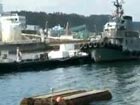| Videos | ? Latest |
|
? Feature | ? Sports | ? Your Videos |
Highly radioactive leak sealed

There's been a breakthrough in the battle to contain the worst nuclear crisis since Chernobyl. Engineers from Tokyo Electric Power have stopped highly radioactive water leaking into the Pacific from the Fukushima power plant. But the trouble is far from over, as TEPCO is still pumping low-level contaminated water into the sea due to the facility's lack of storage space.
Wednesday morning Tokyo Electric Power Company gave a rare bit of good news. Its workers finally stemmed a tide of radiation pouring into the Pacific.
The injection of 15 hundred liters of "water glass," or sodium silicate, and another hardening agent, near the seaside pit appeared to be successful.
But the situation is not yet under control.
The utility operator is still being forced to pump 11 thousand, five hundred tons of low-level radioactive water back into the sea, to free up more space to store highly-contaminated water.
Yukio Edano, Japanese Chief Cabinet Secretary said "The measure was to prevent highly radioactive water from spreading. But we are dumping radioactive water, and we feel very sorry about this."
Further more, TEPCO is faced with the massive problem of how to store 60 thousand tons of contaminated seawater used to cool over-heated fuel rods.
Analysts say TEPCO's decision to displace the contaminated water into the ocean reflects the urgency of clearing the turbine buildings and trenches of radioactive water, so as not to damage equipment needed for the restoration of the cooling systems.
While TEPCO officials are investigating whether the contaminated water is leaking from other places, radiation concerns in the area are intensifying. Samples of the water used to cool reactor No. 2 were 5 million times the legal limit of radioactivity on Tuesday, adding to fears that contaminants had spread far beyond the disaster zone. And small levels of radiation have been detected as far away as Europe and the west coast of the United States.
Authorities insist the radioactive water will dissipate and pose no immediate threat to sea creatures or people who might eat them. And the government has set limits for the first time on the amount of radiation permitted in fish. But the mere suggestion that seafood from the country that gave the world sushi could be at any risk has already stirred worries throughout the fishing industry.
 0
0 






